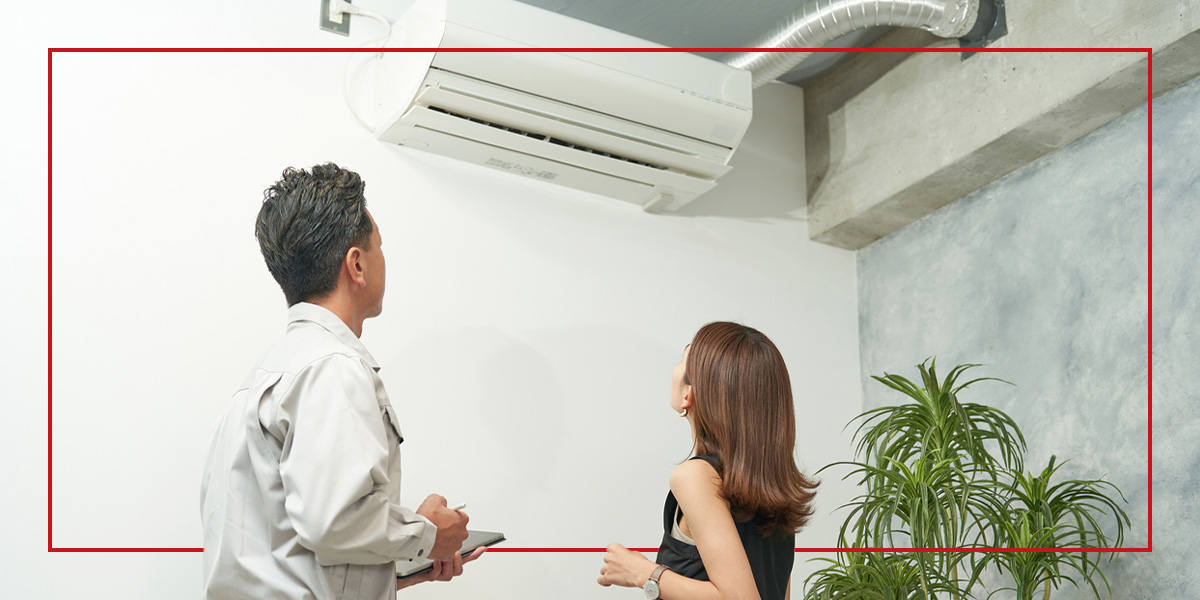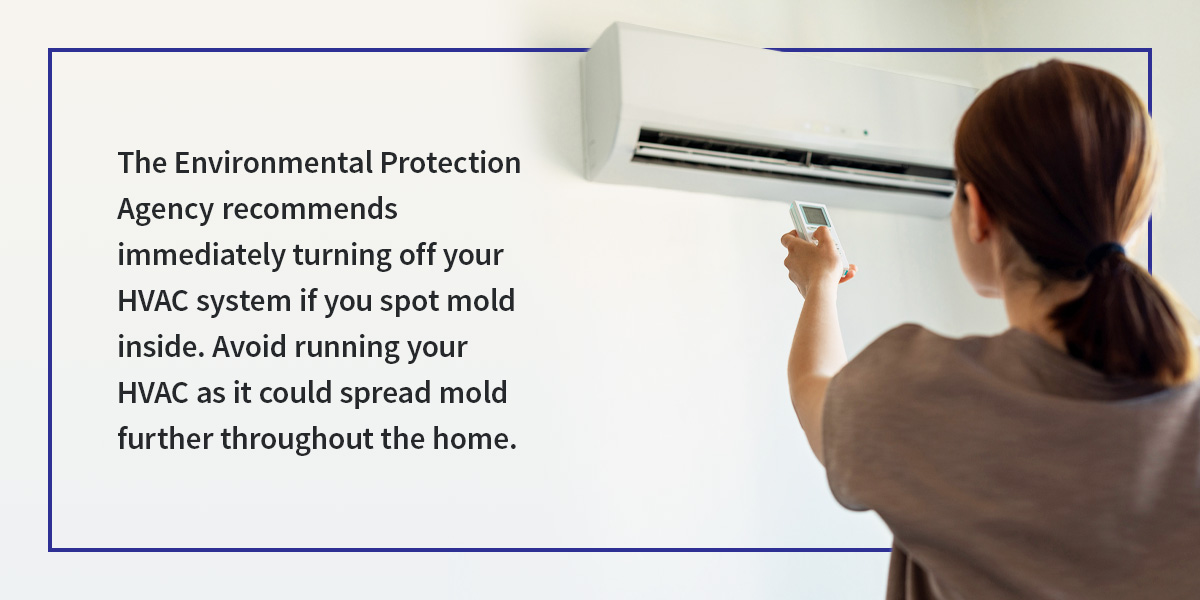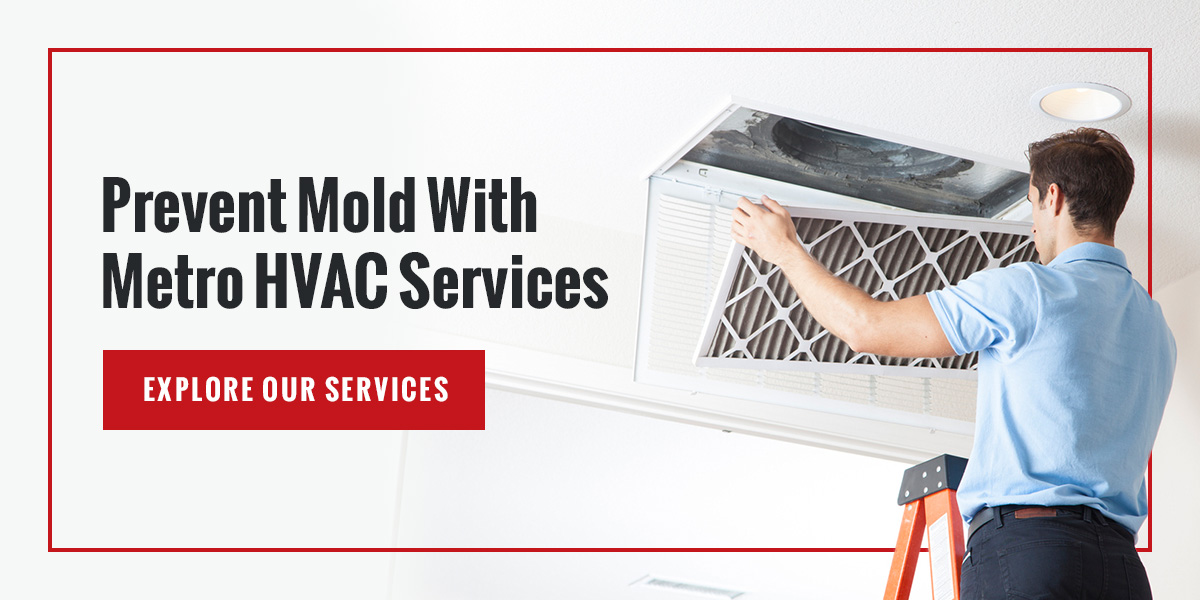What to Do if You Find Mold in Your AC Unit

You depend on your air conditioner to keep your home cool during the blazing summer months. When winter arrives, it’s easy to overlook your AC unit, letting it sit until it’s needed next year. However, neglecting your air conditioner during the winter can allow leaks and other issues to spring up. When AC problems occur and the moisture level increases in and around the unit, mold can quickly spread.
Having mold inside your air conditioner makes your home uncomfortable, causing allergy-like symptoms and discomfort. Finding mold in your air conditioner can initially seem overwhelming, but it is fixable. Understanding how to prevent, recognize and remove mold in your AC unit will go a long way toward making your home cleaner and safer to live in.
Dangers of Moldy Air Conditioners
Moldy air conditioners can spread mold spores throughout your home, potentially causing health issues for anyone inside the house. While not everyone experiences poor health effects after mold exposure, some potential mold-related health effects include:
- Itchy or red eyes
- Wheezing
- Irritated skin
- Stuffy nose
- Difficulty breathing
- Mold infections
Moldy AC units will affect everyone differently — the people most at risk from mold include those with allergies, asthma, immune suppression and breathing conditions. Anyone with breathing conditions or a weakened immune system should avoid areas with mold to help protect their health.
How Mold Grows in Your AC Unit
Mold thrives in wet environments. If mold spores find a spot with an organic food source and moisture, they begin to spread and flourish. An AC unit with a leak or high humidity is ideal for mold growth. While mold typically doesn’t grow in an in-use air conditioner, a unit that sits unused and unchecked over the winter can create an excellent environment for mold to grow.
The weather may also contribute to mold growth. Leaks from melting snow during a Maryland or D.C. winter or excess humidity during the warm summer can create an ideal environment for mold. Keeping your HVAC system well-insulated and moisture-free will protect it from mold contamination.
Mold spores travel into your AC unit on the wind, clothes or your pet — they’re everywhere in nature. Spores settle in your dormant AC unit with some dust. A leak or excess humidity might create dampness that lets the mold thrive when combined with the organic dust material. It begins to spread, and you might not notice anything until you turn your air conditioner on for the summer.
Signs You Have Mold in Your AC Unit
If you or your household notice some strange health effects, you might have mold in your AC unit. While you’ll want to call in professional services if you find mold, knowing what to look out for will help you catch mold early. The earlier you spot mold and prevent its spread, the safer your home will be.
Look for these signs if you suspect you have mold in your air conditioner:
- Irritated breathing, eyes, skin or noses when running the air conditioner
- A musty or distinct odor when the unit runs or near the vents
- Grey, brown, black or white spots spread around drip pans, vents and evaporator coils.
If you spot one or more of the above signs, there’s a good chance you have mold. Contact an expert for mold removal, and avoid using the air conditioner until the mold is gone.

What to Do if You Find Mold in Your AC Unit
If you’ve noticed signs of mold and are experiencing health issues, you must immediately take action. The earlier you can head off the mold, the healthier you’ll be and the more time and money you’ll save.
The Environmental Protection Agency recommends immediately turning off your HVAC system if you spot mold inside. Avoid running your HVAC as it could spread mold further throughout the home. Next, contact a professional mold remediation service to handle the issue — air conditioners are complex and require expert handling for mold removal. Consider staying elsewhere until the mold is completely removed. Leaving protects your health and helps professionals complete their work quickly.
How to Prevent Mold in Your AC Unit
You’ll save money and protect your health with proper mold prevention methods. It’s far more expensive and time-consuming to pay for a thorough, effective mold cleanup than it is to practice good mold prevention. Getting regular air conditioner inspections helps you to catch issues early before they turn into a full-scale mold problem. Yearly inspections will review your unit and check for the conditions that lead to mold.
Additionally, investing in an HVAC maintenance plan will help maintain your unit’s life and efficiency and prevent mold. These checks will look for leaks, improper installation and condensation levels, which can encourage mold growth. Perform visual inspections yourself regularly to help keep leaks away and humidity levels down. Also, consider investing in a well-insulated unit — this will keep moisture out and prevent mold growth from occurring.
Finally, change your filters regularly. Filters prevent air from flowing through correctly, catching dust and causing increased humidity. Swapping out filters according to your manufacturer’s instructions will provide your home with better, cleaner air and helps keep mold away. You should also invest in professional duct cleaning to help keep dust and moisture buildup out of your ducts and system.
How to Remove Mold From Air Conditioners
You should avoid removing mold yourself. While vacuuming, soap and water can remove some of the spores, at-home mold removal is not going to remove mold as effectively as professional remediation. Additionally, you will likely damage your AC system when cleaning in and around the unit.
Instead of DIY-in your mold removal, contact a professional service to handle your problem. Professional mold remediation is thorough, efficient and lasting. Experienced mold removal professionals have the training, knowledge and equipment necessary to safely and effectively remove mold from your air conditioner. They’ll properly contain the mold before using professional chemicals and a sealer or encapsulant to remove the mold and prevent further growth from spreading.
Prevent Mold With Metro HVAC Services
Metro HVAC Services provides Maryland and D.C. residents with unmatched HVAC services. With comprehensive service plans and extensive air conditioning, heating and plumbing experience, you can count on our team to provide you with the best HVAC assistance possible. Metro HVAC Services’ professional duct cleaning will help prevent mold growth and provides your home with better, cleaner air. Whether you need a regular maintenance plan or emergency repairs, trust Metro HVAC Services to help your home.
If you live in the Maryland/D.C. area, explore our comprehensive HVAC services. Get your HVAC assistance started by filling out our online form today.

